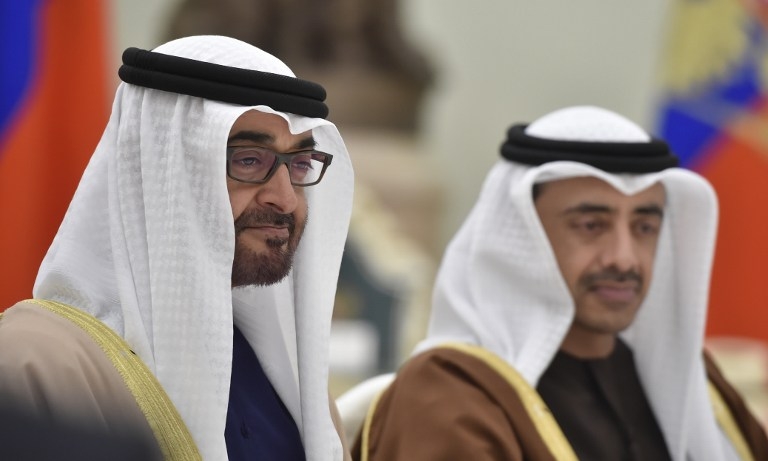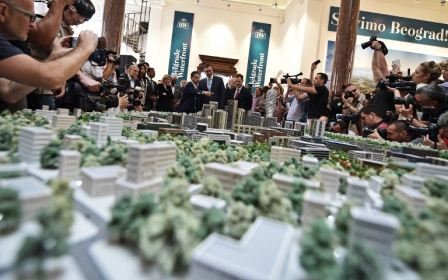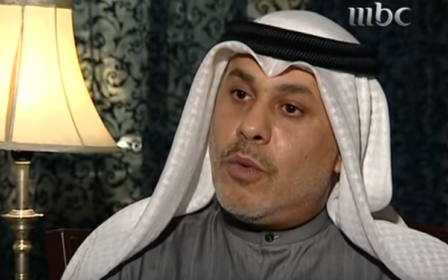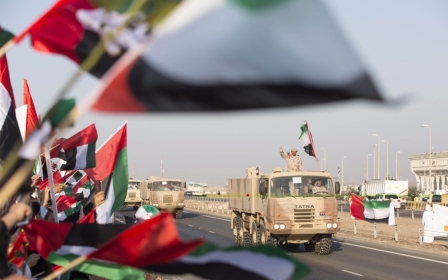Secret UAE surveillance programme reveals the true face of a police state

The New York Times revealed this week that I am one among more than 1,000 people who the United Arab Emirates has likely attempted to place under covert surveillance using sophisticated spyware bought from European technology companies.
The report showed that the UAE spent $634,500 in 2015 in an attempt to install spyware on the computers of 1,100 dissidents and journalists. The spyware was found to have been sent by a company that was traced back to a member of the Abu Dhabi royal family - an accusation Emirati authorities told the New York Times they were investigating.
The reason why Emirati authorities would target me for surveillance is because between March 2012 and April 2014 I documented human rights abuses in the UAE while working for an organisation I helped found - the Emirates Centre for Human Rights.
The work done by American computer expert Bill Marczak in uncovering the Emirati spy program targeting dissidents, activists, and journalists is hugely important because it reveals a little told side of the UAE – one of a police state using its vast wealth to use any means possible to shut down dissent both at home and overseas.
It is undeniable that since independence in 1971, the UAE has gone through a dramatic period of development fuelled by petrodollar wealth that has seen it transform from a desert state into becoming the region’s central transport and business hub.
More than that, the UAE has become a tourist hotspot for anyone seeking lavish seven-star hotels, upscale shopping centres, and a place to unwind where you can either sizzle on a beach under a perpetually hot sun or enjoy one of Dubai’s many manmade wonders including skiing at the world’s largest indoor slope.
Last year the UAE held elections to vote in half of the 40 members who make up the country's parliament - the Federal National Council (FNC). In what authorities trumpeted as a show of development, the electorate was expanded by more than 60 percent on the last vote in 2011, with 224,279 handpicked Emiratis out of an estimated total population of 1.4 million allowed to take part.
But this vote, in which the turnout was just 35 percent, elected members to a parliament that is toothless - the FNC is a purely advisory body that has no executive power.
While pushing the line that the state is moving toward the constitutionally stated goal of building a democracy, Emirati authorities have long been keen to demonstrate their progress on women's rights, with Ohood al-Roumi selected to serve as the country's "Minister for Happiness" last year, an announcement which came 12 months after Mariam al-Mansouri gained global fame as the country's first female fighter pilot while bombing the Islamic State.
But scratch beneath what is superficial glamour and piecemeal development and you are left with an authoritarian state whose pretences at liberalism and democratisation are a fig leaf designed by highly-paid public relations firms who have successfully built a global brand that has seen the Emirates slogan emblazoned on everything from the football shirts of Real Madrid to the cable cars of London.
Over the past four and a half years I have consistently documented the secret detention, alleged torture, and subsequent long-term imprisonment of Emirati dissidents brave enough to speak out and call for reform of a political system that allows them little say in how their country is governed.
These human rights violations have taken place in a climate of abuse that includes the mass mistreatment of migrant workers; a legal system that lacks any semblance of true independence; and countless incidences of people falling foul of ridiculous laws – be it women arrested for reporting rape or young businessmen imprisoned for gently satirising life in Dubai.
This spread of abuse has occurred over the course of a decade in which the country has come to be dominated by a new generation of Emirati leaders who have increasingly turned to oppression and surveillance as a way of maintaining a stranglehold over power.
Since the death of the country's much-loved first leader Sheikh Zayed in 2004 the UAE leadership in Abu Dhabi has become ever more paranoid, leading to moves that demonstrate how authorities view the public with almost complete suspicion.
As well as covertly attempting to spy on the private communications of dissidents and activists, Emirati authorities have built a mass civil surveillance system installed by an Israeli owned company that monitors the entire lives of every person living in Abu Dhabi.
Emirati public figures often speak accurately about the security threat facing them in a tumultuous region and it is an argument to be deployed when defending mass surveillance, but it is also an argument that opens up why the UAE is not publicly admonished for its terrible human rights record.
The UAE is a key ally of the United States, Britain and other European nations, who view Abu Dhabi as being one of very few regional players who can be counted on both militarily and politically when it comes to fighting for stability amid the violent growth of militant groups including the Islamic State.
But while the UAE has contributed positively to the war on IS, it has also waded in unwisely to rollback changes sought by the 2011 Arab Spring protests. From Libya to Yemen the UAE has bombed in an attempt to gets its own way, and from Tunisia to Egypt it has used its economic might to try and shape domestic politics.
Both the UAE’s domestic and foreign oppression is rooted in the same goal of attempting to maintain the Abu Dhabi royal family’s aim of retaining and growing personal economic wealth through maintained and increased political power.
The first step to understanding the façade of UAE liberalism is to side-step the commonly held belief that most of its people are content with having been made wealthy in return for respecting the absolute political authority of the seven emirates’ royal families.
This is because it is impossible to gauge whether or not Emiratis are truly happy with their lives, because the UAE is a place where people are broadly aware that any perceived transgression can land you in prison – or worse.
The revelation that the UAE has likely been covertly attempting to spy on dissidents at home and overseas is simply another example of how in public Emirati leaders present themselves as being a bastion of stability and progress in the Middle East, whereas in private they are willing to get involved in the dirty work of clinging to power without any regard for anyone's rights - be they Emirati or from overseas.
It is far beyond time that the UAE leadership is recognised for what it is: A dictatorship which - while being sleekly managed by public relations firms - is fixedly intent on getting as rich as it possibly can through the wielding of global political power and exercising of as much oppression as it takes to get there.
- Rori Donaghy is a news editor at Middle East Eye and he has had his work published in the Guardian, Independent, Huffington Post and elsewhere. He previously founded the Emirates Centre for Human Rights, which was the first independent organisation to focus on human rights abuse in the United Arab Emirates.
The views expressed in this article belong to the author and do not necessarily reflect the editorial policy of Middle East Eye.
Photo: Sheikh Mohammed bin Zayed al-Nahyan (L), Crown Prince of Abu Dhabi and UAE's deputy commander-in-chief of the armed forces (AFP)
New MEE newsletter: Jerusalem Dispatch
Sign up to get the latest insights and analysis on Israel-Palestine, alongside Turkey Unpacked and other MEE newsletters
Middle East Eye delivers independent and unrivalled coverage and analysis of the Middle East, North Africa and beyond. To learn more about republishing this content and the associated fees, please fill out this form. More about MEE can be found here.





